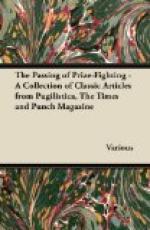“Ah, we did that,” sighed out the elderly workman, “because we were too backward to attempt anything better. We were not clever people like you! We couldn’t play the piano, and paint and swim, and go in for chemistry. We were not clever enough, and had to put up with passing a very low standard.”
“Thank your lucky stars it was so,” exclaimed the chemist, with tears in his eyes, “for your fate is happier than ours. We are all fifth-rate, and can do nothing else. We have no chance against those who have been born to this kind of thing, and we have forgotten how to do your work. So we are starving, and—”
But here the old man was interrupted by a policeman, who ordered all of them to move on. And on they moved. Half one way and half the other.
* * * * *
OUR OWN FINANCIAL COLUMN.
“CROESUS” has vanished! We can scarcely find it in our heart to add anything to this distressing statement; but for the sake of our readers whom he may have induced to patronise his financial schemes, we give a few slight details of the disaster.
[Illustration: Portrait of “Croesus.”]
Four days ago enormous piles of letters began to arrive at our office. They were addressed to “CROESUS,” and had been sent on to us from his last address marked “gone away; try office of Punch.” We opened them. They were all threatening letters.
“Why,” wrote one angry gentleman, “have I heard nothing from you since I sent you my cheque for L10,000? Unless I receive a reply within a week, legal proceedings will be taken.” The rest were similar in tone. Thereupon we resolved to call at the last address given to us by “CROESUS.” It was somewhere in the Mile End Road. We arrived, entered, ascended the stairs, and found in a dingy back bed-room, three used half-penny stamps, a false nose, a pair of whiskers, and a large sheet of paper on which were written only these words: “Sold Again”—which obviously referred to some financial scheme or other. On inquiring of the landlady, we heard that her lodger had departed two days before, taking with him two large and heavy wooden chests. He had promised to return. We then consulted the police. They are very reticent, but consider they have got a clue.
And here we owe it to our readers to make a confession. We have never set eyes on “CROESUS.” We engaged him entirely on the strength of the most glowing recommendations from a whole bevy of Bank-Managers, including the Managers of the Bank of Lavajelli, of the Pei-ho Provinces, of Samarcand, of Ashanti and of Dodge County, U.S.A. All these gentlemen wrote in the most complimentary terms of “CROESUS.” “He is a man,” wrote the Manager of the Dodge County Bank, “whom I have had the honour to know intimately for a considerable number of years. Indeed, we were educated together, and not a day has passed since then without our meeting. I beg to state that I consider him thoroughly fitted for




